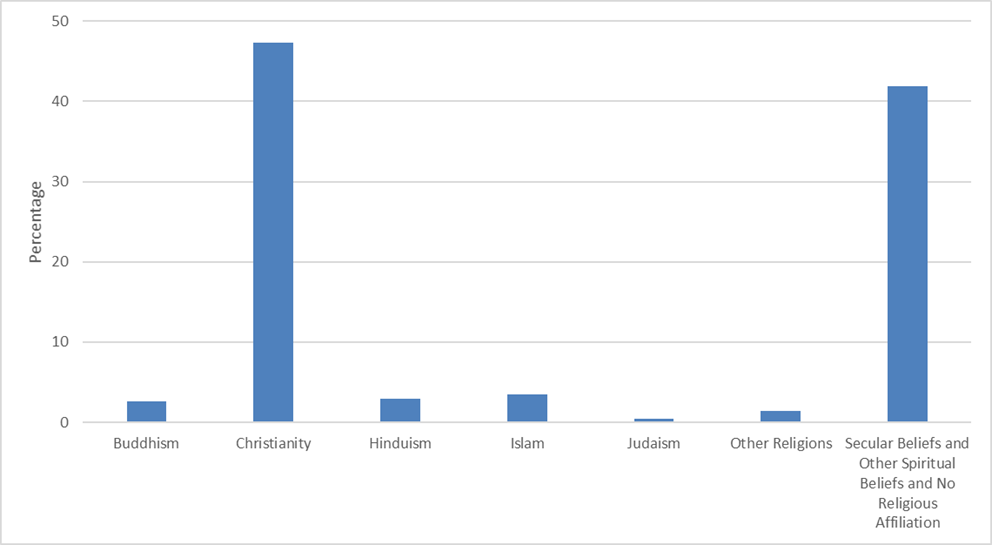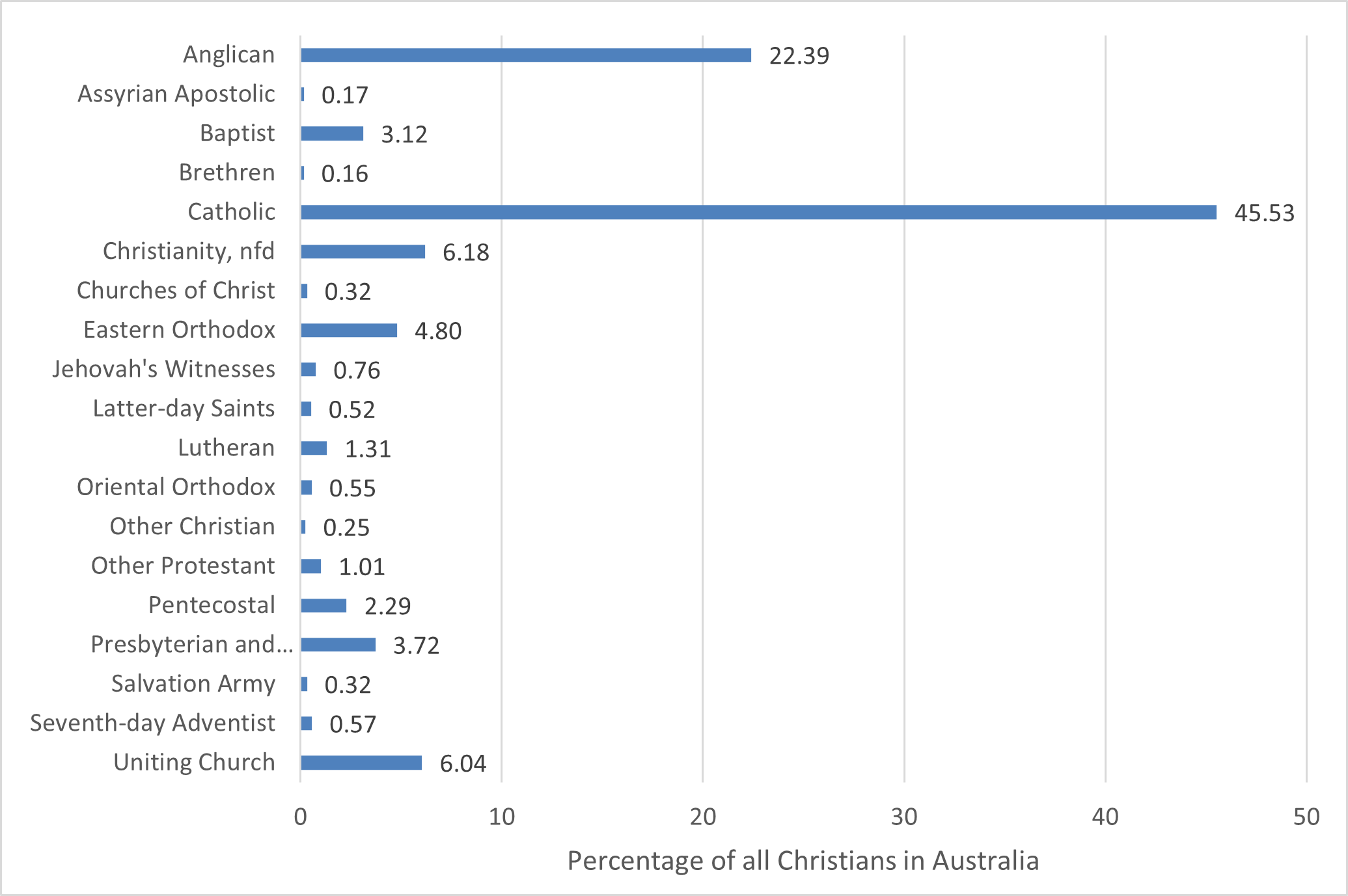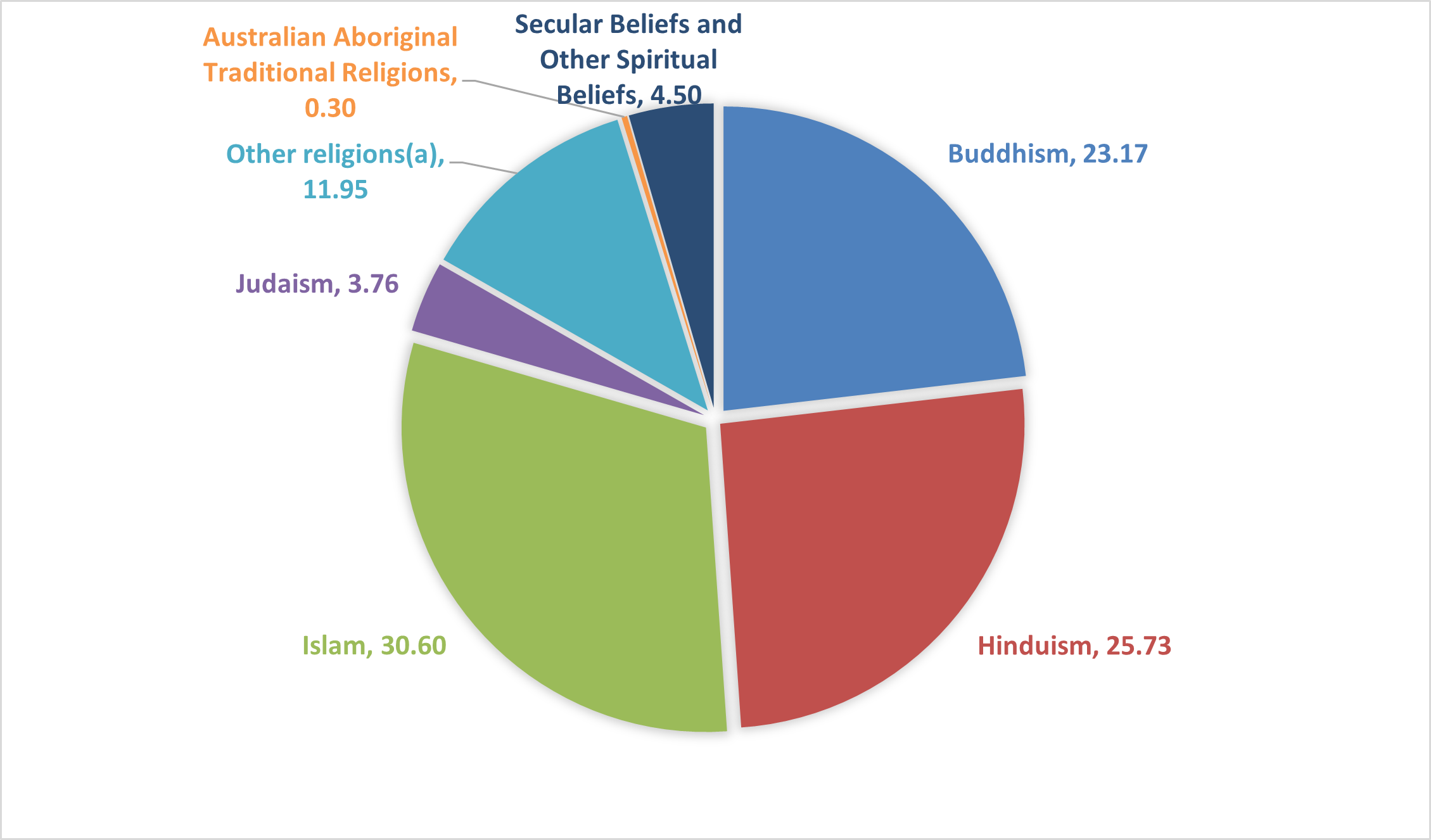Religions span national, geographic, cultural and ethnic boundaries and may be the focus of individual and family identification
Religious institutions and observances play an important role in catering for people’s social, psychological and cultural needs as well as their spiritual needs.
In the 2021 Census, Christianity remains the most common religion with 43.9 per cent of the population identifying as Christian, a decrease from 52.1 per cent in the 2016 Census. Non-Christians represented about 10% of the population, an increase from 8% in the 2016 census. The percentage of Australian’s reporting no religious affiliation continues to grow. It’s now at 38.9 per cent of the population compared to 30.1 per cent in the 2016 Census. The religious composition of the States and Territories varies.
Source: Australian Bureau of Statistics 2021, Customised tables
| New South Wales | Victoria | Queensland | South Australia | Western Australia | Tasmania | Northern Territory | Australian Capital Territory | Other Territories |
| Christianity (3,844,453) | Christianity (2,657,748) | Christianity (2,357,398) | Christianity (712,815) | Christianity (1,093,666) | Christianity (213,933) | Christianity (94,142) | Christianity (173,227) | Christianity (1,428) |
| Islam (349,240) | Islam (273,028) | Buddhism (73,697) | Islam (40,302) | Islam (66,764) | Hinduism (9,724) | Hinduism (6,236) | Hinduism (20,505) | Islam (769) |
| Hinduism (273,780) | Hinduism (214,058) | Hinduism (69,250) | Hinduism (38,105) | Buddhism (57,622) | Buddhism (5,605) | Buddhism (4,883) | Islam (14,613) | Buddhism (268) |
| Buddhism (222,770) | Buddhism (204,493) | Islam (60,381) | Buddhism (33,788) | Hinduism (52,055) | Islam (4,947) | Australian Aboriginal Traditional Religions (3,437) | Buddhism (12,696) | Hinduism (12) |
| Sikhism (47,165) | Sikhism (91,745) | Sikhism (27,713) | Sikhism (17,259) | Sikhism (18,583) | Sikhism (2.208) | Islam (3,437) | Sikhism (4,323) | Sikhism (5) |
| Judaism (40,249) | Judaism (46,645) | Judaism (4,815) | Judaism (1,145) | Judaism (5,669) | Judaism (376) | Sikhism (1,401) | Judaism (886) | Judaism (3) |
Christianity
Australia’s major religion is Christianity with the major denominations, in order of size, being Catholic, Anglican, Uniting Church, Eastern Orthodox, Presbyterian and Reformed, Baptist and Pentecostal. 30% of the Australian population reported that they were either Anglican or Catholic in the 2021 Census.
Source: Australian Bureau of Statistics 2021, Customised tables
Other major religions
Non-Christian religions in Australia include Islam, Hinduism, Buddhism, Sikhism and Judaism. Islam is the largest non-Christian religion with followers comprising 3.2% of the total population. Followers of Hinduism, the second largest non-Christian religion represented in Australia, make up about 2.7% of the total population. About 2.4% of Australians follow Buddhism and less than 1% of the total population follow Sikhism and Judaism respectively.
The following pie chart shows the proportion of followers of each non-Christian religion as a percentage of the total of all non-Christian religions observed by Australians reported in the 2021 Census.
Aboriginal and Torres Strait Islander spirituality
Since contact, Aboriginal and Torres Strait Islander people have been affiliated with various religions.
However, for Aboriginal and Torres Strait Islander people, the concept of ‘spirituality’ refers to a more holistic view of life – in particular one’s link with the land, sea and air. Consequently, this relationship confirms one’s identity and place as an Aboriginal person and or a Torres Strait Islander person.
There are no words in English to appropriately describe Aboriginal and Torres Strait Islander spirituality. The term ‘Dreaming’ has been associated with Aboriginal spirituality but does not adequately reflect its complexity or the fact that the ‘Dreaming’ permeates every aspect of Aboriginal cultures and societies. ‘Dreamings’ will vary from group to group.
For Torres Strait Islanders, terms such as ‘Before, Before time’; ‘Before time’; ‘Kulai tonar’; and ‘Zogo time’ are markers that identify the time prior to contact and the introduction of religion into the Torres Strait Islands. Like the Aboriginal Dreamings, Creation Stories or Legends from the Torres Strait Islands provide a basis for identity.
In the 2021 Census, 7,887 people were recorded as practising Australian Aboriginal traditional religions. Northern Territory had the highest number of people recorded as practising Aboriginal traditional religions (3,437), followed by New South Wales (1422), Western Australia (1096) and Queensland (979).
Footnotes
- [1] Defined as born outside the ‘Main English Speaking Countries’ of Australia, Canada, Ireland, New Zealand, South Africa, United Kingdom and the USA.
- [2] Excludes Christmas Island, Cocos (Keeling) Islands, Jervis bay Territory and Australian external territories.
- [3] Remainder “not stated” or “inadequately described”.
- [4] See Note 1 above.
- [5] Includes England, Scotland, Wales, Northern Ireland, Channel Islands, Isle of Man and United Kingdom not further defined.
- [6] Excludes Hong Kong, Macau and Taiwan.
- [7] Other territories include Christmas Island, Cocos (Keeling) Islands and Jervis Bay Territory.
- [8] Department of Home Affairs, Australia’s Offshore Humanitarian Program: 2020-21.



